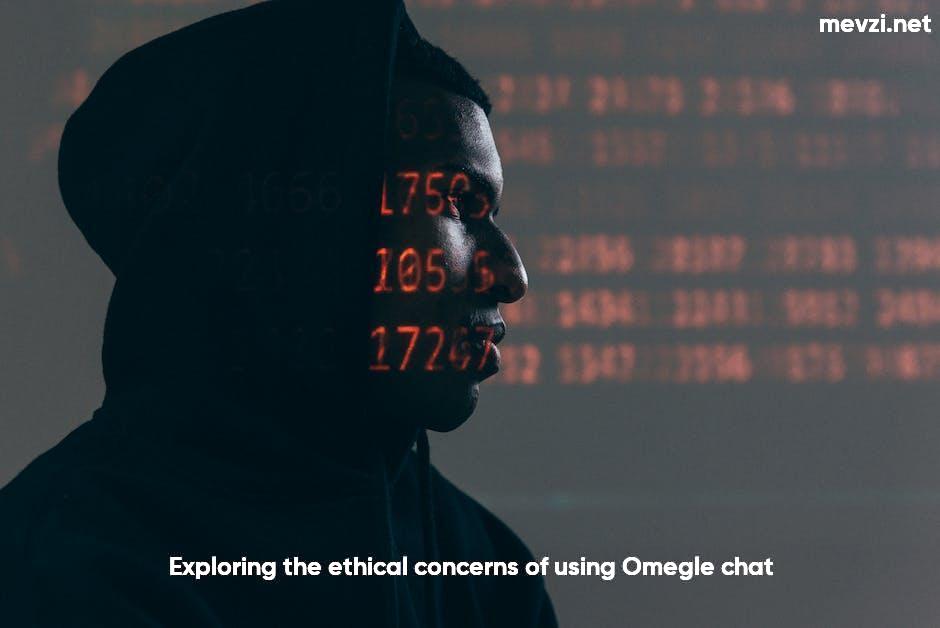Omegle chat is a platform that allows users to have anonymous conversations with strangers. While it can be an entertaining way to meet new people and explore different perspectives, there are also several ethical concerns associated with its use.
1. Privacy and Consent: Omegle chat doesn’t require any formal registration process, which means users can easily engage in conversations without providing any personal information. However, this anonymity can also lead to potential privacy violations. Users need to be cautious about sharing personal details, as they have no control over how their information may be used by others.
2. Inappropriate Content: Omegle chat is known for its lack of moderation, leading to instances of harassment, cyberbullying, and exposure to explicit content. Some users may engage in inappropriate behavior, making others feel uncomfortable or unsafe during conversations. It is essential to be aware of this risk and exercise caution when using the platform.
3. Exploitation and Predation: The anonymous nature of Omegle chat makes it vulnerable to exploitation and predation. Individuals with malicious intentions can use this platform to groom and manipulate unsuspecting users, especially minors. This raises serious child safety concerns and highlights the need for enhanced regulation and monitoring.
4. Mental Health and Emotional Well-being: Interacting with strangers on Omegle chat can have a significant impact on an individual’s mental health and emotional well-being. Users may encounter offensive or hurtful comments, leading to feelings of distress, anxiety, or depression. It is crucial to prioritize one’s mental well-being and disengage from conversations that may be harmful.
5. Lack of Accountability: Due to the anonymous nature of Omegle chat, there is a lack of accountability for users’ actions. This creates an environment where users may feel emboldened to engage in unethical or illegal behavior without facing consequences. The absence of real identities can contribute to a culture of irresponsibility and make it challenging to take appropriate action against offenders.
In conclusion, while Omegle chat can be a fascinating tool for connecting with strangers, it is essential to recognize and address the ethical concerns associated with this platform. Users should prioritize their privacy and well-being, be cautious about engaging in conversations, and report any instances of harassment or inappropriate behavior. Additionally, governments and tech companies should take steps to enhance moderation, implement stricter guidelines, and promote safer online interactions. 
The Importance of Ethical Considerations in Online Communication
In today’s digital age, online communication has become an integral part of our daily lives. From social media platforms to email and messaging apps, we rely heavily on these channels to connect with others, share information, and express ourselves. However, it is essential to recognize the importance of ethical considerations in online communication.
First and foremost, ethical online communication fosters trust and credibility. When interacting with others online, it is crucial to be mindful of our words and actions. Treating others with respect, kindness, and empathy not only reflects well on our character but also encourages a positive and inclusive digital community.
Furthermore, ethical considerations in online communication involve being honest and transparent. Misrepresentation, deception, and spreading false information not only undermine trust but also have the potential to harm individuals and society as a whole. By valuing honesty and truthfulness in our online interactions, we contribute to a more reliable and trustworthy online environment.
Moreover, ethical online communication respects privacy and autonomy. In a world where personal data is constantly being collected and used for various purposes, it is vital to prioritize the privacy and autonomy of individuals. Obtaining consent before sharing someone else’s personal information, respecting their boundaries, and refraining from invasive behaviors are all essential ethical practices in online communication.
- Choose your words wisely: Words have power, and online communication amplifies this power. Whether it’s a public post, a private message, or a comment on someone else’s post, every word we write has consequences. Practice thoughtful and constructive communication to foster a positive online environment.
- Think before you share: With the prevalence of fake news and misinformation, it is crucial to verify the accuracy and reliability of the information we share online. Responsible sharing helps prevent the spread of false information and promotes informed discussions and debates.
- Show empathy and understanding: Online communication often lacks the non-verbal cues and facial expressions that are present in face-to-face interactions. Therefore, it is essential to practice empathy and understanding when engaging with others online. Consider different perspectives, be open-minded, and avoid unnecessary confrontations.
- Respect others’ opinions: In a diverse world, it is inevitable that people will have different opinions and beliefs. Ethical online communication involves respecting these differences and engaging in constructive dialogue rather than resorting to personal attacks or insults.
In conclusion, ethical considerations play a crucial role in online communication. By practicing kindness, honesty, respect, and empathy, we contribute to a positive and inclusive digital community. Let us all strive to uphold ethical principles in our online interactions for a better, more responsible online world.

Understanding the privacy risks of using Omegle chat
Omegle chat is a popular online platform that allows users to anonymously chat with strangers from all over the world. While it can be a fun and exciting way to meet new people, it’s important to understand the privacy risks involved.
One of the main concerns when using Omegle chat is the potential for your personal information to be shared with others. The website states that it does not store chat logs or personal details, but it also warns that “you may still encounter users who might misbehave.” This means that there is a possibility for someone to capture screenshots or record conversations without your knowledge or consent.
Another privacy risk of using Omegle chat is the potential for your IP address to be exposed. Your IP address is a unique identifier that can be used to track your online activities and potentially determine your physical location. While Omegle claims to keep your IP address private, there have been reports of security breaches in the past.
- Always be cautious of the information you share during an Omegle chat. Avoid giving out personal details such as your full name, address, phone number, or social media profiles. Remember, you are chatting with strangers and it’s important to protect your privacy.
- Consider using a VPN (Virtual Private Network) when accessing Omegle chat. A VPN can help mask your IP address and provide an extra layer of security and privacy.
- Be mindful of the content you share during an Omegle chat. Avoid sharing explicit or sensitive material that could potentially be used against you.
- If you experience any form of harassment or inappropriate behavior during an Omegle chat, report it immediately. The website has a reporting feature that allows users to flag and report abusive users.
In conclusion, while Omegle chat can be a fun and exciting way to meet new people, it’s important to be aware of the privacy risks involved. Always be cautious of the information you share, consider using a VPN for added security, and report any inappropriate behavior. By taking these precautions, you can enjoy a safer and more private experience on Omegle chat.

Examining the potential dangers of interacting with strangers on Omegle
In the digital age, it has become increasingly common for people to connect with others online. Platforms like Omegle provide individuals with a chance to meet new people, chat, and make friends. However, it is essential to be aware of the potential dangers that come with interacting with strangers on Omegle. This article will explore these dangers and provide valuable insights on how to stay safe while using the platform.
One of the primary concerns when it comes to interacting with strangers on Omegle is the risk of encountering individuals with malicious intent. Unfortunately, not everyone online has good intentions, and some individuals may try to exploit or harm others. It is crucial to remain cautious and vigilant while communicating with strangers on Omegle.
Anonymity on Omegle can be both a blessing and a curse. On one hand, it allows individuals to be themselves without the fear of judgment or consequences. On the other hand, it also makes it easier for people to hide their true identity and engage in inappropriate or harmful behavior. It is important to remember that not everything people say on the internet is true, and one should always take precautions when interacting with strangers.
| Danger | Precautionary Measures |
|---|---|
| Inappropriate Content | Exercise discretion and avoid sharing personal information or engaging in explicit conversations. |
| Cyberbullying | Report and block any users who engage in abusive or harassing behavior. |
| Scammers | Do not respond to requests for personal information or financial assistance from strangers. |
| Stranger Danger | Never agree to meet someone from Omegle in person, and be cautious when sharing photos or videos. |
While it is crucial to be aware of the potential dangers, it is also important not to let fear consume one’s online experience. There are steps that one can take to minimize the risks and enjoy interacting with others on Omegle safely. By following basic online safety guidelines, such as protecting personal information and reporting inappropriate behavior, users can create a positive and secure environment for themselves and others.
In conclusion, interacting with strangers on Omegle can be an exciting way to connect with different individuals. However, it is essential to acknowledge the potential dangers and take necessary precautions. By being vigilant, exercising discretion, and following online safety guidelines, users can navigate the platform safely and enjoy a positive chatting experience.

Ethical perspectives on the use of Omegle for research purposes
Omegle, a popular online platform, has garnered attention in recent years for its potential use in research studies. However, ethical concerns have arisen regarding the use of this platform for research purposes. This article explores the various ethical perspectives surrounding the utilization of Omegle in research and highlights the key considerations for researchers.
One of the primary ethical concerns associated with using Omegle for research is the issue of informed consent. In traditional research settings, participants are typically provided with a consent form outlining the purpose of the study, potential risks, and their rights as participants. However, on Omegle, users engage in anonymous conversations, raising questions about obtaining informed consent. Researchers must carefully navigate this ethical dilemma and ensure that participants are fully aware of the research objectives and any potential risks involved.
Another ethical concern pertains to privacy and confidentiality. Omegle’s design emphasizes anonymity, allowing users to interact without revealing their identities. Therefore, when utilizing this platform for research purposes, researchers must take stringent measures to protect the privacy and confidentiality of participants. It is imperative to establish robust protocols for data storage, ensuring that participants’ identities and personal information remain anonymous and secure.
- Transparency: Researchers must be transparent about the purpose and nature of the study when engaging with participants on Omegle. Clear communication and honesty are crucial in maintaining ethical integrity.
- Data Protection: Strict measures should be in place to safeguard the privacy and confidentiality of participants’ information. Data anonymization and secure storage protocols must be implemented.
- Informed Consent: Researchers should explore innovative ways to obtain informed consent from participants, taking into account the limitations of anonymity on Omegle. Ensuring that participants are fully aware of the research objectives and potential risks is essential.
- Beneficence: Researchers must consider the potential benefits and harms of utilizing Omegle for research and strive to maximize the former while minimizing the latter. The potential insights gained through this platform should outweigh any potential risks to participants.
In conclusion, the use of Omegle for research purposes raises important ethical considerations. Informed consent, privacy protection, transparency, and beneficence are key ethical principles that researchers must uphold when utilizing this platform. By carefully navigating these ethical dilemmas and prioritizing the well-being and rights of participants, researchers can ethically conduct research on Omegle and contribute valuable insights to their respective fields.

Exploring the Role of Parental Supervision in Ensuring Ethical Use of Omegle Chat
Omegle chat has gained immense popularity among internet users, especially teenagers, as a platform for meeting new people and engaging in anonymous conversations. However, with this anonymity comes the potential for inappropriate behavior and unethical use of the platform. As responsible adults, it is crucial for parents to actively supervise their children’s online activities and educate them about the potential risks associated with Omegle chat.
One of the key roles of parental supervision in the context of Omegle chat is to protect children from exposure to explicit and harmful content. By monitoring their online interactions, parents can ensure that their children are not exposed to inappropriate discussions or encounters that may negatively impact their mental and emotional well-being.
Furthermore, parents should have open and honest conversations with their children about the ethical use of Omegle chat. It is essential to teach them about the importance of treating others with respect, not engaging in bullying or harassment, and understanding the consequences of their actions in an online environment.
- Emphasize the significance of privacy: Parents should educate their children about the importance of safeguarding their personal information on Omegle chat. Encourage them to never share their full name, address, phone number, or any other sensitive information with strangers.
- Promote digital citizenship: Teach children about the concept of digital citizenship and responsible online behavior. Discuss the impact their actions can have on others and the broader online community. Encourage them to report any inappropriate or concerning behavior they come across on the platform.
- Set boundaries and time limits: Establish clear guidelines for using Omegle chat, including specific time limits and appropriate usage. By setting boundaries, parents can ensure that their children do not spend excessive amounts of time on the platform or engage in conversations that may compromise their safety.
Ultimately, parental supervision plays a vital role in shaping children’s online behavior and ensuring the ethical use of Omegle chat. By being actively involved in their children’s digital lives and fostering open communication, parents can create a safe and healthy online environment for their children.
In conclusion, the role of parental supervision in the ethical use of Omegle chat cannot be underestimated. By actively monitoring their children’s online activities, educating them about responsible online behavior, and setting clear boundaries, parents can protect their children from potential harm and promote a positive digital experience.
Frequently Asked Questions
What are the ethical concerns of using Omegle chat?
Using Omegle chat raises several ethical concerns, including:
- Privacy: Conversations on Omegle can be recorded or monitored without consent, leading to potential privacy violations.
- Inappropriate Content: Omegle is known for its high probability of encountering explicit or inappropriate content, which may be harmful to some users.
- Exploitation: Users, especially minors, can be targeted by predators who seek to exploit them or engage in harmful activities.
- False Impersonation: The anonymous nature of Omegle can encourage individuals to pretend to be someone they are not, leading to deception or manipulation.
- Bullying and Harassment: Omegle chats can quickly turn into platforms for bullying, harassment, or cyberbullying.
How can I protect my privacy while using Omegle?
To protect your privacy on Omegle, follow these tips:
- Do not disclose personal information, such as your full name, address, phone number, or school/work details.
- Use a virtual private network (VPN) to hide your IP address and location.
- Avoid enabling video chat and stick to text-only conversations.
- Consider using a pseudonym or fake name instead of your real identity.
- If you encounter any suspicious behavior or feel uncomfortable, immediately end the conversation.
What should I do if someone on Omegle sends explicit or inappropriate content?
If someone on Omegle sends explicit or inappropriate content, you should:
- Immediately end the conversation and disconnect from the user.
- Report the incident to the Omegle administrators or moderators.
- Do not engage in any further communication with the individual.
- If necessary, block the user to prevent future interactions.
- Consider discussing the incident with a trusted adult or seeking support from helplines or counseling services.
Is Omegle safe for minors?
No, Omegle is not considered safe for minors. Its anonymous nature and lack of strict age verification make it easy for predators to target and exploit vulnerable individuals, including minors. Parents and guardians are strongly advised to supervise their children’s internet activities and restrict access to platforms like Omegle.
Should I trust strangers on Omegle?
No, it is not advisable to trust strangers on Omegle or any similar platforms. The anonymity provided by these platforms makes it difficult to verify the true intentions of the individuals you encounter. It is essential to prioritize your safety and exercise caution when interacting with strangers online.

